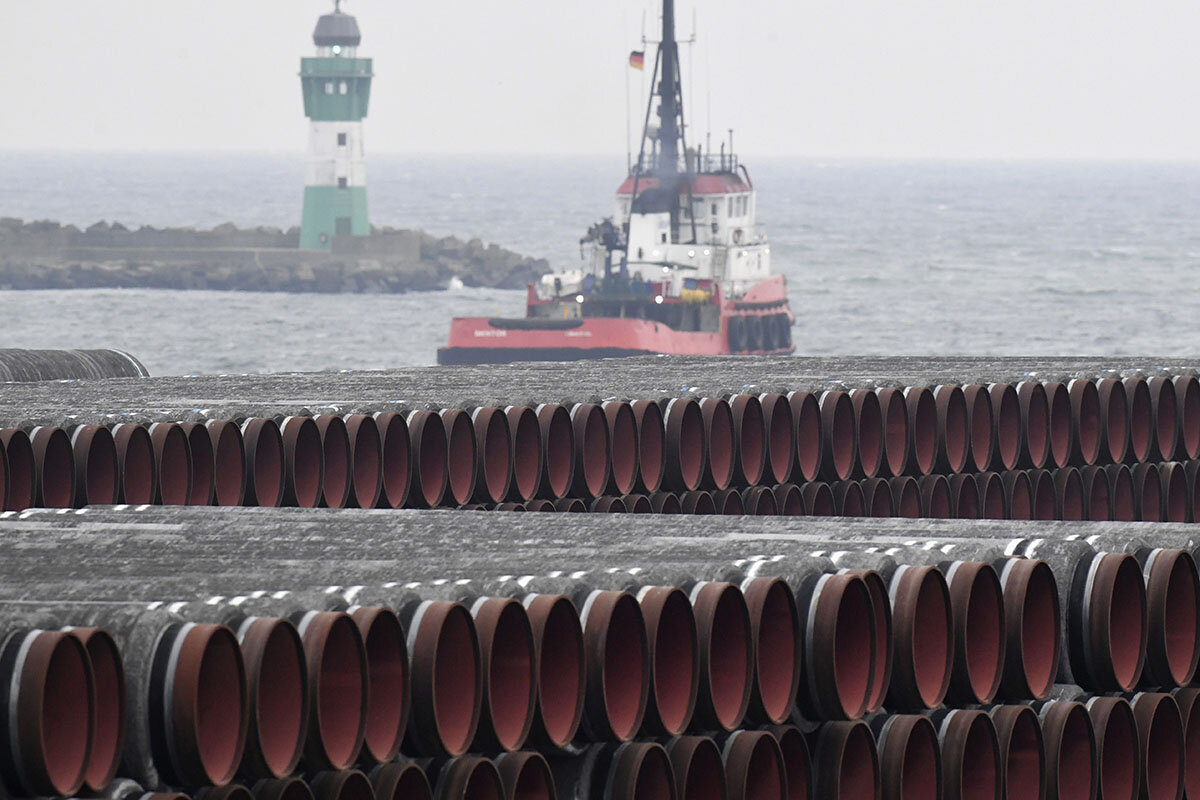Europe, divided on Russia, hesitant to back Biden
Loading...
| London
For Vladimir Putin, the timing of the Ukraine crisis could hardly be better; for Joe Biden, hardly worse.
Because a resolution of the crisis will depend not just on Moscow and Washington, but on dozens of European countries that lie between them. And America’s European allies are less ready to mount a unified response – or to make common cause with Washington – than at any time in recent years.
Their actions in the coming days could prove critical to Washington’s hope of finding a diplomatic way out.
Why We Wrote This
What to do about Russia is not a clear-cut question for Europeans, who must balance their commitment to democracy with pressing economic realities.
And in the longer run, they will help define Europe’s future strategy toward both of the major powers now locking horns over Ukraine: the United States and Russia.
The Europeans are in the throes of what might be called a geopolitical identity crisis. Deeply unsettled by the go-it-alone presidency of Donald Trump, they have been asking themselves how much they can rely on the transatlantic alliance, especially now that Washington’s top foreign-policy priority is China.
Europe is also debating its attitude to Russia, given that the continent is much more closely linked economically with Moscow – and hugely more energy-dependent on the Russians – than the United States.
That debate has highlighted different views on how to deal with Mr. Putin: The former Soviet states near Russia have far fewer doubts on the need for a robust deterrent to his growing regional ambitions than do capitals farther west.
At the same time, the crisis also finds key European leaders preoccupied with politics closer to home.
British Prime Minister Boris Johnson is neck-deep in controversy over a series of Downing Street parties held at a time when the rest of the country was in lockdown. French President Emmanuel Macron faces a stern reelection test in April.
In Germany, the three-party coalition that has taken over from long-serving Chancellor Angela Merkel appears divided over how tough a line to take with Russia.
For Mr. Biden, the stakes could hardly be higher. A key element of his plan to deter Mr. Putin from invading Ukraine is to demonstrate shoulder-to-shoulder resolve across the Western alliance that the Russian president would pay an immediate and painful political and economic cost if he moved further against Ukraine.
After an 80-minute video call on Monday he declared “total unanimity with all the European leaders.”
But while that’s almost certainly true should Mr. Putin launch a full-scale invasion, it’s still not clear whether the allies would respond unanimously to lesser forms of aggression such as cyberattacks, cross-border artillery fire, missile or drone strikes, or a raid aimed at seizing further territory in eastern Ukraine and destabilizing the pro-Western government in Kyiv.
That’s what Mr. Biden referred to at a news conference last week as a “minor incursion.” In that case, he said, “we end up having a fight [with the European allies] about what to do and not do.”
That remark was undeniably a diplomatic gaffe: Ukrainian leaders accused the president of effectively giving a greenlight to Mr. Putin for such a “minor incursion.”
But it was also true. And even though, as the crisis ramps up, a number of European NATO states are sending weapons to Ukraine and beefing up their military presence in Eastern Europe, that diplomatic calculus has probably not changed.
Would Germany, for instance, be ready to mothball the new pipeline designed to carry more Russian natural gas to Europe, bypassing an existing route through Ukraine? The coalition government’s foreign minister, Annalena Baerbock, has long favored scrapping it, but there has been no sign Chancellor Olaf Scholz would contemplate that.
Germany and France also this week reopened a diplomatic track of their own. They scheduled a meeting with Russian officials within the framework of the still-unimplemented cease-fire plan they negotiated with Moscow following a Russian-supported uprising in Eastern Ukraine eight years ago.
For France, there’s a powerful, long-term logic to such separate initiatives: a desire to develop a more autonomous European role on the world stage.
That would not mean jettisoning close ties with Washington, nor unwinding the NATO security alliance. But it would recognize that Europe – collectively, the world’s third-largest economic power after the U.S. and China – has interests of its own to defend.
If President Macron is reelected in April, there is little doubt that he would continue to press for more European “strategic autonomy.”
But Mr. Putin’s military buildup, along with his drive to restore Russia’s Soviet-era sphere of influence, has highlighted an awkward obstacle to any common approach in Europe: disagreement, in light of Western Europe’s economic ties with Russia, over how to balance such practical considerations with the continent’s core commitment to democratic values.
European leaders will need to make much more progress toward an answer to that question if they are to offer President Biden the solid support he is seeking.








